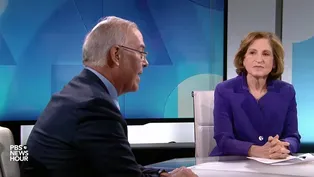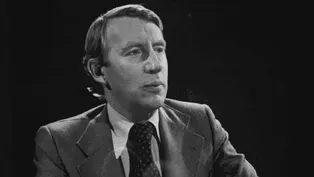
Robert MacNeil's colleagues remember his life and legacy
Clip: 4/12/2024 | 9m 6sVideo has Closed Captions
Robert MacNeil's colleagues and friends remember his life and legacy
Former colleagues of NewsHour co-founder Robert MacNeil joined to reflect on his life and career after his death at the age of 93. Judy Woodruff, Jeffrey Brown and former executive producer Linda Winslow worked with MacNeil over many years and counted him as a dear friend.
Problems playing video? | Closed Captioning Feedback
Problems playing video? | Closed Captioning Feedback
Major corporate funding for the PBS News Hour is provided by BDO, BNSF, Consumer Cellular, American Cruise Lines, and Raymond James. Funding for the PBS NewsHour Weekend is provided by...

Robert MacNeil's colleagues remember his life and legacy
Clip: 4/12/2024 | 9m 6sVideo has Closed Captions
Former colleagues of NewsHour co-founder Robert MacNeil joined to reflect on his life and career after his death at the age of 93. Judy Woodruff, Jeffrey Brown and former executive producer Linda Winslow worked with MacNeil over many years and counted him as a dear friend.
Problems playing video? | Closed Captioning Feedback
How to Watch PBS News Hour
PBS News Hour is available to stream on pbs.org and the free PBS App, available on iPhone, Apple TV, Android TV, Android smartphones, Amazon Fire TV, Amazon Fire Tablet, Roku, Samsung Smart TV, and Vizio.
Providing Support for PBS.org
Learn Moreabout PBS online sponsorshipJoining us now to reflect on his life are Judy Woodruff, Jeffrey Brown, and Linda Winslow, former executive producer of this program.
They all worked with Robin over many years.
First, my sympathies to each of you on the loss of your dear friend.
Judy, I know Robin was for you not just a treasured colleague.
He was also an inspiration.
In what ways?
JUDY WOODRUFF: He was, Geoff.
And I have to say, I'm heartbroken, as everyone is today who knew Robin.
He was not only one of the most important mentors in my life.
He was a dear friend.
I talked to his son Ian today, who said that right up until the end of his life, Robin was following the news.
He said he insisted on talking about what was in the news literally right up until the very last day he was alive.
And that was the consummate newsman.
That's who Robin was.
He's the reason I joined the "NewsHour" when he and Jim expanded it, made it the "NewsHour" in 1983.
They had this amazing chemistry.
They were not only extraordinary journalists.
They had this kind of magic between the two of them.
And I can tell you that it was so much so that when, just a few months into the "NewsHour" -- and I was still getting my feet wet -- Jim had a heart attack, and I was asked to fill in for just a few months, and I could not have done it without Robin.
Robin gave me the confidence to sit at the desk and keep going.
And so, yes, he was a mentor and an inspiration the entire -- for his entire life.
GEOFF BENNETT: Jeff, how did Robin influence you as a journalist and leave a real imprint on your work?
JEFFREY BROWN: Well, profoundly, Geoff.
I have been -- like Judy and Linda, I'm sure, I have been hearing from colleagues all day long who recall stories and the gratitude that we all feel.
For me, it's simple, but profound.
I mean, he was the exemplar.
He was the model.
I met him when I was young.
And as you often are when you're young, you're trying to figure out what you want to do.
And in this case, what kind of journalist could I be and what kind of journalism could I do?
And there was Robin.
I distinctly remember -- and this goes back more than 30 years -- sitting at the table with him for our editorial meeting and thinking to myself, where else would I want to be but listening to him talk about the news, think about what we would be doing that night.
He had the most capacious mind.
He was interested in everything, so world affairs, literature.
And he brought all of that to bear on the news.
And it had an incredible impact on all of us.
Look, I mean, you're lucky in life to know a few people that have that kind of effect.
I can say, without any question, I would not be sitting here today without the influence of Robin MacNeil.
I dearly admired and loved him.
GEOFF BENNETT: Linda, does that resonate with you?
LINDA WINSLOW, Former Executive Producer, "PBS NewsHour": Absolutely.
It's the same man.
We all knew the same man.
He was a mentor and a colleague, but he was also just a great, fun human being to be around.
And I remember a trip we took.
We were covering the Reagan-Gorbachev summit in Moscow in '88.
And there was an awful lot of interviewing to be done about submarine-launched ballistic missiles.
But he insisted at one point that we were going to go out and interview Yevtushenko, the Soviet-Russian poet, because that's the kind of guy he was.
And that's who he was most interested in talking to as long as he was in Russia.
And he did a spectacular interview, but he also stuck to his guns on the other stuff.
We also had some fun with his former colleagues at NBC who were up on the roof of our hotel having a much more lavish meal than we were having down in our workroom.
(LAUGHTER) LINDA WINSLOW: And Robin managed to go up there and catch some free caviar for all of us, which I will be always grateful to him for.
(LAUGHTER) GEOFF BENNETT: Well, help us understand the working relationship and the friendship he shared with Jim Lehrer.
LINDA WINSLOW: It was truly unique.
And that's, I think, one of the things that resonated with everybody I have talked to today.
Because of their friendship, they created an atmosphere of respect for each other and having each other's backs.
There was never any concern about being knifed in the back by your colleague or colleagues.
And, as a result, we worked in an environment where we respected the audience, as he said in that piece Jeff just showed us, and respected each other and respected the staff, as well as the news and the newsmakers and guests who came on the program.
Everyone was treated equally.
GEOFF BENNETT: Yes.
Jeff Brown, tell us more about the early days, what it was like working alongside Jim and Robin.
JEFFREY BROWN: Well, the thing that really strikes me, I want to refer to that memoir that Robin wrote called "Wordstruck."
That was Robin.
Robin was wordstruck.
It was even his e-mail address.
The man was besotted with words.
He loved writing them.
He loved speaking them.
He loved the history of them.
He loved the geography of them, and, therefore, those two wonderful documentaries he did about the story of English and American.
And that showed up in the journalism.
I mean, if you're a person who loves to go out into the world and you're interested in all kinds of things and want to tell stories, and then you have this capacity to use words to write them and tell those stories, and then you have this incredible voice -- I remember Jim would always say -- he certainly said it to me -- that Robin could read the phone book, right, and make it sound like great literature, which was true.
(LAUGHTER) JUDY WOODRUFF: Yes.
JEFFREY BROWN: But he also had the ability to use words to practically turn journalism into a kind of literature.
And that -- you asked about what it was like working with him.
That's what it was like, because you kind of saw that interest in the world, but also the ability to convey it.
And I think, when I talk to people, when I think about the impact on my own life and I hope my own work, that's what comes through, is that love of telling stories, that love of using words, and that love of reaching out to talk to people that way.
GEOFF BENNETT: Judy, Amna is traveling on assignment today, but we traded messages earlier about how Robin's influence, his sober approach to the news, the pursuit of truth above all else, how that is really evident in the work that we do.
As we wrap up this conversation, I'd like to invite you to weigh in on that.
How is his legacy manifest in this program even today?
JUDY WOODRUFF: It is manifest in so many ways, Geoff.
I'm glad -- I'm not at all surprised to hear that you and Amna were trading messages about it, as she's, you said, overseas.
Robin just exuded the kind of excellence in journalism, the belief that journalism can make a difference, the belief, frankly, that journalists shouldn't take too -- ourselves too seriously.
He - - I can't tell you the number of times I would be talking to him, and he'd remind me that journalism is about the stories that we're covering and not about the person doing the reporting.
And that's been such an important part of, I think, the "NewsHour" ethos, that we are about -- the "NewsHour" is about reporting on the most important things that are happening and sharing that with the American people, sharing that with our audience.
Robin believed that to his very core.
He had the kind of integrity that you just -- you just -- you have to imagine in many ways today.
It was a -- he set an example that, just by his being there, just by his doing his job, the rest of us knew that that was the gold standard.
And he was supportive always of the rest of us.
And I always knew that Robin had my back.
And, as Jeff has mentioned, the chemistry that he and Jim had together, it was this I call it kind of a magic pixie dust that made the program what it is and that will make this -- make sure that this is a program that endures for a long, long time to come.
GEOFF BENNETT: Judy Woodruff, Jeffrey Brown, Linda Winslow, our thanks to each of you for sharing your memories and special connections to Robin MacNeil.
We appreciate it.
And, as we mourn his loss, we invite you to share your memories of Robert MacNeil on our Web site.
That's PBS.org/NewsHour.
Brooks and Marcus on abortion restrictions motivating voters
Video has Closed Captions
Clip: 4/12/2024 | 10m 40s | Brooks and Marcus on how abortion restrictions could motivate voters in November (10m 40s)
Israel awaits possible retaliatory attack from Iran
Video has Closed Captions
Clip: 4/12/2024 | 4m 43s | Israel awaits possible retaliatory attack from Iran and proxy forces (4m 43s)
Renowned journalist, NewsHour co-founder Robert MacNeil dies
Video has Closed Captions
Clip: 4/12/2024 | 13m 2s | Renowned journalist and NewsHour co-founder Robert MacNeil dies at 93 (13m 2s)
What to expect when Trump's 1st criminal trial begins Monday
Video has Closed Captions
Clip: 4/12/2024 | 7m 26s | What to expect when Trump's 1st criminal trial begins Monday (7m 26s)
Providing Support for PBS.org
Learn Moreabout PBS online sponsorshipSupport for PBS provided by:
Major corporate funding for the PBS News Hour is provided by BDO, BNSF, Consumer Cellular, American Cruise Lines, and Raymond James. Funding for the PBS NewsHour Weekend is provided by...















